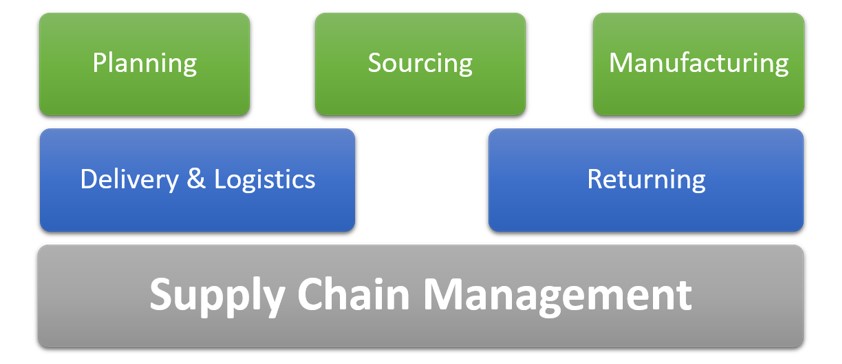


10,Nov 2023
In essence, Supply Chain Management (SCM) is the process of ensuring that goods reach consumers when they need them and at a cost they can bear. It’s a system that connects businesses with their customers. Everything you wear, consume, or use has been made available to you through the expertise of supply chain professionals. Remember the Covid-19 situation. The choice of vaccine manufacturers, the production and distribution methods, and even the final vaccination, all are examples of supply chain operations. Similarly, when you shop online, these retailers employ cutting-edge technology in their logistics to ensure your order is delivered to your doorstep.
The 5 key components of the Supply Chain Management are

Let’s discuss the key components in brief.
| Process | Description |
|---|---|
| Planning | Refers to analyzing and managing resources that are required to fulfil the customer’s demand for product and services. Further, this process involves determining whether the supply chain is capable to deliver goods and services promptly to the customer and thereby meets company goals. |
| Sourcing | Refers to the stage where suppliers are shortlisted to offer their specialized products and services to produce the final product. While procuring goods and services from suppliers, a dedicated relationship is maintained throughout the production and delivery cycle to furnish the order and payment receipts to maintain the inventory stocks. |
| Manufacturing | Refers to a collage of activities that include receiving accepting raw materials, starting manufacturing of the product, performing quality checks, packaging goods for shipping, and forecasting the schedule for delivery at the customer’s end. |
| Delivery & Logistics | Refers to activities that collect customer orders, plan the delivery of products, dispatch loads, generate invoices for the customers and acknowledge & receive payments from the customer. |
| Returning | Refers to the process of accepting defective or unwanted products from the customer and arranging paperwork for repayment/replacement while sending a note to the inventory. |
Supply chain management operates on regional, national, and global scales and is omnipresent. It is the linchpin that keeps the gears of industry and economy turning. Our everyday lives are significantly influenced by the successful management of supply chains within a global economy. Supply chains are a vital component of the economy, providing employment to over a million people.
If you possess skills such as persuasion, influence, interpersonal communication, and the ability to collaboratively solve complex problems, a career in supply chain management could be a perfect fit for you. The skills acquired in this field can also pave the way for careers in business, human resources, or finance. There are numerous career opportunities available, including roles in inventory management, transport management, production management, and procurement management.
The course PGDM in Supply Chain Management comprises several benefits and advantages that create keen interest in the students to excel themselves in this particular field in recent times.
Through PGDM in SCM, you’ll acquire analytical methods and technical skills that enhance decision-making capabilities. The curriculum includes learning about risk management, strategic management, logistics management, and the procurement of goods and supply line management. You’ll gain hands-on experience with professional software, systems, and tools, and delve into the ethical and sustainable aspects of global supply chains.
These skills can be applied across various domains such as vehicle routing, scheduling, facility location, assignment, and resource allocation problems. In addition to these technical skills, the program also emphasizes the development of soft skills such as leading change, building effective teams, persuasion, influence, and relationship management.
If you possess the ability to persuade, influence, build relationships, and solve intricate problems through teamwork, a career in supply chain management could be an excellent fit for you. The competencies you acquire could also pave the way for roles in business, human resources, or finance. There’s a plethora of career paths available, including inventory management, transportation management, production management, and procurement management. It’s a thrilling, multifaceted, and rewarding career trajectory.
Upon successful completion of the course, a wealth of attractive job opportunities await, such as Supply Chain Manager, Transportation Manager, Front Line Supervisor, Demand Planner, and many more within this specific domain. The starting salary for Supply Chain Managers typically falls between INR 6-9 lakhs per annum, while seasoned professionals can expect to earn around INR 10-15 lakhs per annum, if not more.
Supply chain managers are pivotal in the process of moving goods from producers and suppliers to end-users. In this role, you would oversee and control every stage of the production flow, from the acquisition of raw materials to the delivery of the finished product. Your duties would encompass guaranteeing that the appropriate volume of a product is manufactured at the correct time and overseeing the storage of the product. Responsibilities such as coordinating the distribution of goods from warehouses to consumers and retail outlets, forecasting patterns, and handling stock levels also fall within the scope of this role.
Following are few ways where SCM is affected by technology:
| Efficiency and Transparency | Technology has made Supply Chain Management (SCM) more efficient and transparent. |
| Employee-Centric Approach | Technology in SCM has shifted the focus towards individual employees, thereby boosting productivity. |
| RFID (Radio Frequency Identification) Tags | RFID tags, which are attached to each product and contain a microchip and antennae, enhance transparency in the system. These tags can be scanned using an RFID scanner to retrieve information such as order number, serial number, batch number, source location, and destination. |
| IoT Sensors | Such types of sensors require dedicated Internet availability for smooth functioning. Via dedicated terminals and customized software, businesses involved in food, hospitals, pharmaceuticals, etc. can track their inventory and automatically raise an alarm and send delivery notes to the supplier whenever the inventory level reaches a low level. Besides handling inventory levels, IoT can be used for monitoring such as the health of patients, temperature of food, toxic levels, and optical sorter to scan impurities. |
| Transportation Software | Such type of software helps to track down the movement of different types of modes of transportation such as trucks, trains, ships, and aero plane. Stakeholders in the supply chain can see the real-time movement of the goods in a responsive environment. |
| Data Analytics | The adoption of data analytics can help businesses to get the best out of the information technology in the supply chain industry. Businesses can predict the demand of goods, analyse consumer behavior, keep watch on whether and thereby make well-informed decisions based on datasets and save huge money. |
| Blockchain, IoT, and Analytics | These three technologies are starting to bring about significant improvements in supply chain management, making it easier to enhance customer fulfillment, meet profitability targets, and build more resilient and sustainable supply chains. |
Lloyd’s PGDM in Supply Chain Management is well acclaimed from industry leaders and business houses. The course is designed exclusively in collaboration with Industry Partner Logistic Skill Sector Council of India to impart students with theoretical and practical aspects of the supply chain. Lloyd’s unique “Work & Learn Programme”, provides OJT to students and equip them well in advance with all those skills and competencies that are in demand within the corporate set-up. This Work & Learn model is most distinguished feature of the course enabling fresh graduates with work experience.
The main highlights of Lloyd PGDM with specialization in Supply Chain Management are:
Kindly click here to know more about PGDM in SCM from Lloyd along with admission criteria, duration, fee structure, and in-campus facilities.
Supply chain is well organized and process centric branch of managing business in B2C, B2B, and D2C environments. Due to rapid adaption of e-commerce in the retail sector, business are now extensively looking for supply chain managers. You can pursue PGDM course with specialization in Supply Chain Management from a reputed institute like Lloyd and acquire skills such as decision making, risk management, strategic management, logistic management, procuring of goods, and supply line management. Besides core skills, you will also learn about soft skills, team management and relationship management. Upon successfully completion of the course you can choose from variety of job opportunities such as Supply Chain Manager, Transportation Manager, Front Line Supervisor, Demand Planner, etc.